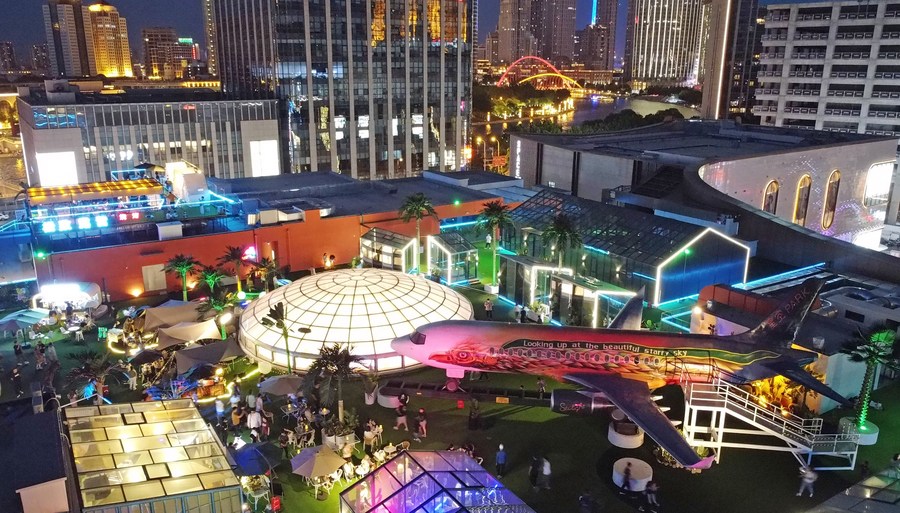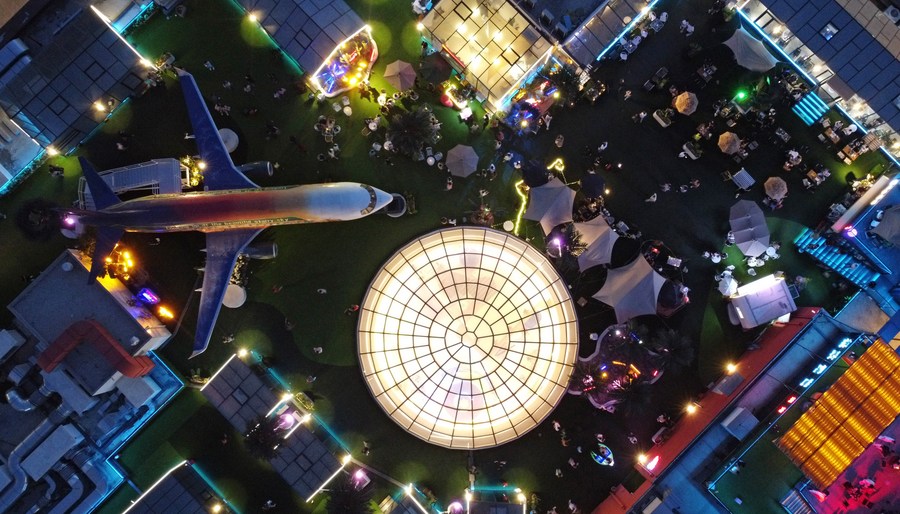
This aerial photo taken on June 2, 2023 shows people having fun on top of a commercial complex in Heping District, north China's Tianjin. (Xinhua/Zhao Zishuo)
TIANJIN, Aug. 5 (Xinhua) -- Amidst the summer heat, numerous people flocked to a night fair in north China's Tianjin Municipality to savor delicious treats at cafes and tea shops, enjoy the company of adorable pets, and immerse themselves in the soothing ambiance of folk music at the open stage, finding respite and relaxation.
In Society Hill, a cultural and tourism street block, a vibrant "dopamine nighttime market" has recently emerged, captivating the hearts of numerous young people with its lively atmosphere, colorful decorations, and innovative consumption setups and models.
"Our nighttime activities changed with the themes and the tourists can always find new experiences at different times," said Han Xu, marketing director of Society Hill Cultural Tourism Port, which runs the street block.
Since the opening of the night fair during the May Day holiday this year, the number of visitors has exceeded 380,000, with the entire street block generating sales of more than 15 million yuan (about 2 million U.S. dollars), according to Han.
Chen Xueqing, who owns a restaurant in the street block, says the change was evident after the opening of the night market. "The restaurant became busy and crowded in the evening, with a continuous stream of customers coming for dinner."
Amid the surging popularity of China's night economy, an array of creative nighttime activities, including shopping, entertainment, sports, exhibitions and performances, have infused the country's cultural and tourism market with newfound vitality.
According to a survey on urban residents' consumption habits conducted by China's Ministry of Commerce, a significant 60 percent of their consumption takes place during the nighttime hours.
Nowadays, an increasing number of consumers are seeking a quality lifestyle to enjoy after a busy day of work.

This aerial photo taken on June 2, 2023 shows people having fun on top of a commercial complex in Heping District, north China's Tianjin. (Xinhua/Zhao Zishuo)
As night fell, a unique and captivating nighttime experience awaited customers at a restaurant in Tianjin. A special play was performed, where the setting, props and costumes beautifully recreated the ambiance of the city's old town. Customers had the opportunity to immerse themselves fully by choosing a character identity and engaging in interactive experiences with skilled actors, all while relishing the authentic flavors of Tianjin cuisine.
"We tell the story of Tianjin's food culture through drama. Many customers are curious about what kind of food they will eat when they act with professional actors in a play. They can enjoy a delightful fusion of sights, sounds and flavors all in one immersive experience," said Wang Jing, of the Tianjin North Performing Arts Communication Co., LTD.
After participating in the play and enjoying the meal, a young customer surnamed You received a short video of the performance, creating a cherished memory for him.
"A camera filmed our play just like in a real film studio. This was not just a meal but a new consumption experience," You said.
Liang Feng, an associate professor at the Business School of Nankai University, pointed out that in the past, China's night economy primarily revolved around taste and audio-visual consumption, but nowadays, customers can enjoy a more immersive and interactive range of activities.
The enhanced nighttime consumption models have emerged as a golden opportunity to drive consumption and stimulate economic growth in various regions across China.
As the cradle of the Chinese revolution, Jinggangshan in east China's Jiangxi Province combined the night economy with the red culture. Beijing forged a collaboration among nearly 40 commercial districts and 200 brands, carrying out more than 100 themed activities to promote nighttime consumption in the city.
According to the e-commerce platform Meituan, the search volume of "night fair" and "night travel" during this summer has increased by 80 percent year on year. The consumption of life services including catering and entertainment peaked at 7 p.m. Besides, restaurants selling midnight snacks increased by 60 percent year on year and the related orders increased by more than 300 percent.
Li Jiwei, deputy dean of Meituan Research Institute, said that with the onset of summer, consumers prefer nighttime fun instead of taking part in activities during the heat of the day. Consequently, a diverse and engaging nighttime consumption scene has blossomed, igniting the vibrancy of the night economy.
Policy support has been crucial for the recovery and expansion of nighttime consumption. China has set up 243 national gathering areas for nighttime cultural and tourist consumption, and the scale of the night economy continues to expand.
"China's night economy has produced visible economic and social benefits. In the future, we need to create more artistic and cultural consumption settings to improve the competitiveness of urban tourism and meet the demands of tourists," said Dai Bin, president of China Tourism Academy. ■




 A single purchase
A single purchase









